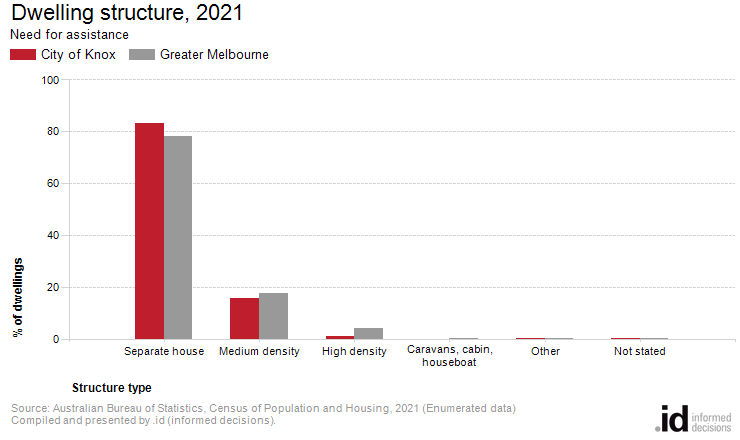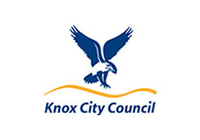City of Knox
Need for assistance - Dwelling type
In the City of Knox 16.7% of people reporting a need for assistance were in medium or high density dwellings.
Dwelling Type is an important determinant of the City of Knox's residential role and function. For people with a disability, housing type can indicate the location where this community lives. It can also indicate the level of assistance with access to housing and transport required by the community.
Dwelling Type statistics should be viewed in conjunction with Household Type, Housing Tenure and Age Structure for a more complete picture of the housing market for people with a disability in the City of Knox.
Derived from the Census:
'Dwelling Structure is derived from the ABS address register supplemented with information from Census Field Officers.'
People with a need for assistance, counted in dwellings
| Dwelling structure | ||||||||
|---|---|---|---|---|---|---|---|---|
| City of Knox - Need for assistance | 2021 | 2006 | Change | |||||
| Dwelling type | Number | % | Greater Melbourne | Number | % | Greater Melbourne | 2006 to 2021 | |
| Separate house | 6,468 | 83.2 | 78.3 | 3,240 | 84.5 | 79.0 | +3,228 | 27001 |
| Medium density | 1,217 | 15.7 | 17.4 | 596 | 15.5 | 18.0 | +621 | 27002 |
| High density | 78 | 1.0 | 4.0 | 0 | -- | 2.8 | +78 | 27003 |
| Caravans, cabin, houseboat | 0 | -- | 0.1 | 0 | -- | 0.1 | 0 | 27004 |
| Other | 4 | 0.1 | 0.1 | 0 | -- | 0.0 | +4 | 27005 |
| Not stated | 4 | 0.1 | 0.1 | 0 | -- | -- | +4 | 27006 |
| Total people counted in occupied private dwellings | 7,771 | 100.0 | 100.0 | 3,836 | 100.0 | 100.0 | +3,935 | |
Source: Australian Bureau of Statistics, Census of Population and Housing (opens a new window) 2006 and 2021. Compiled and presented by .id (opens a new window)(informed decisions).
| Dwelling type | ||||||||
|---|---|---|---|---|---|---|---|---|
| City of Knox - Need for assistance | 2021 | 2006 | Change | |||||
| Dwelling type | Number | % | Greater Melbourne | Number | % | Greater Melbourne | 2006 to 2021 | |
| Occupied private dwellings | 7,771 | 84.8 | 88.5 | 3,836 | 75.7 | 80.9 | +3,935 | 27500 |
| Non private dwellings | 1,398 | 15.2 | 11.5 | 1,234 | 24.3 | 19.1 | +164 | 27502 |
| Total people counted in occupied dwellings | 9,169 | 100.0 | 100.0 | 5,070 | 100.0 | 100.0 | +4,099 | |
Source: Australian Bureau of Statistics, Census of Population and Housing (opens a new window) 2006 and 2021. Compiled and presented by .id (opens a new window)(informed decisions).

Compiled and presented by .id (informed decisions).

Compiled and presented by .id (informed decisions).
Dominant groups
Analysis of the types of dwellings for people reporting a need for assistance in the City of Knox in 2021 shows that 83.2% of people with a need for assistance were in separate houses; 15.7% were medium density dwellings, and 1.0% were high density dwellings, compared with 78.3%, 17.4%, and 4.0% in the Greater Melbourne respectively.
Emerging groups
The total number of people reporting a need for assistance in dwellings in the City of Knox increased by 4,099 between 2006 and 2021.
The largest changes in the type of dwellings for people reporting a need for assistance in the City of Knox between 2006 and 2021 were:
- Separate house (+3,228 persons)
- Medium density (+621 persons)
- High density (+78 persons)
